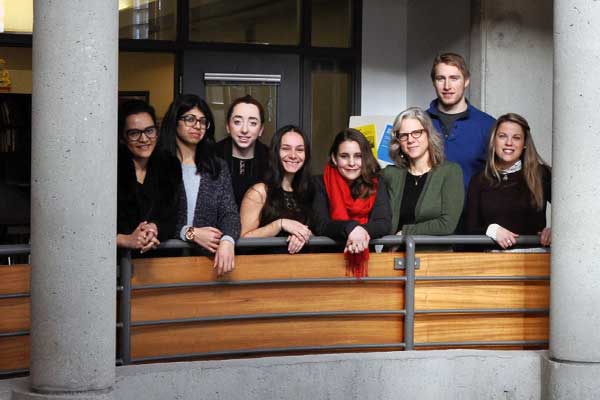
Innovative teaching wins Northrop Frye Award
Published: February 18, 2015
Pamela Klassen’s passion for teaching and research has brought her the 2015 Northrop Frye Award. The award recognizes distinguished achievements in linking teaching and research. Klassen, from the department for the study of religion, was nominated by some of her graduate students.
“It is a special thing to be nominated by students, and it is very special to get an award named for Northrop Frye because he was such a legendary scholar and teacher,” said Klassen, whose office is located in Northrop Frye Hall at Victoria College.
A dedicated researcher herself, Klassen finds unique ways to bring research into the classroom, often using the City of Toronto as a laboratory.
“Toronto is an amazing site for studying religion, either historically or ethnographically,” Klassen said. “From my first year at U of T, teaching the introductory World Religions course, I had students out walking in the city, looking for religion in both likely and unlikely places.” Working with Frances Garrett, a previous Northrop Frye Award winner, Klassen developed a third-year Religion in the City course that had students do research in city neighbourhoods to explore the ways religion had influenced various public sites, such as education, healthcare and the landscape itself.
“The architecture of the city may appear largely Christian, with churches on many corners and subway stations called St. Andrew’s and St. Patrick’s, but Toronto is now a very religiously diverse city,” Klassen said. “And long before those churches were built, there was an Aboriginal presence on this land.”
Team teaching and collaboration appeal strongly to her. She has team-taught courses with DSR colleague Kevin O’Neill, and is currently team-teaching a Big Ideas course about the internet, with computer scientist Steve Easterbrook and environmental scientist Miriam Diamond.
Working with Ajay Rao at U of T Mississauga, Klassen created Museums and Material Religion, a course that examined how museums present objects as “religious” in today’s multicultural society. Each professor taught a section of the course on his/her campus, and classes met periodically at the Royal Ontario Museum to examine the museum’s collections.
“Many ROM collections were gathered by Christian missionaries,” Klassen said, “which adds another layer to the story of religion in the museum.
“With the help of ROM curators, we gave the students theoretical tools to think about the significance of religion for the way that objects have been collected and curated, and then sent them into the museum to develop their own 'object stories'.They were very creative.”
The Museums course came out of the Religion in the Public Sphere Initiative, which Klassen directs.
“Religion in the Public Sphere brings together faculty, students and community partners engaged in questions of how religious diversity is play in public contexts, and has been an important place for students to see how what they are learning applies in real-world contexts. The RPS service learning course is a great example of this.”
Klassen has also been involved with the Faculty of Arts & Science 299 research opportunities program. For several years, she has had teams of undergraduates assisting her with her research for course credit. Four students are now helping Klassen to create a digital storytelling platform to accompany her forthcoming book.
She has also participated in the Faculty of Arts & Science 399 research excursion courses, taking students with her to archives in the U.S. As well, the Germany/Europe Fund supported Klassen, along with colleagues Amira Mittermaier and Simon Coleman, in bringing graduate students on several visits to research workshops in Germany.
“It’s fabulous that Arts & Science has all of these programs students can make use of to develop themselves as researchers,” Klassen said.
She believes strongly in tying teaching and research together.
“I need to do both,” Klassen said, “in order to be good at either. And I think that students learn better when tasked with research of their own. Once students actually realize that they can create knowledge and are accountable for it, they want to learn more and care more about what they are learning.”
Klassen said that most of the assignments she gives include writing, which is another important research skill.
“I like to help students become better writers, because doing their own research makes them want to communicate it,” she said. “The best research tells a really good story based on evidence.”
The Northrop Frye Award is presented along with several other faculty, staff and student awards under the banner of Awards of Excellence. A complete list of this year’s recipients and their citations will be available soon on the Awards of Excellence website. This award program annually recognizes the outstanding members of the University of Toronto community who have made rich and meaningful contributions to the University, their communities and to the world.
Alumni Relations, within the Division of University Advancement, is the steward of the Awards of Excellence program on behalf of the University of Toronto Alumni Association, and co-ordinates the vital contributions of other University stakeholder groups toward this prestigious award program.
Professor Klassen and other 2015 Awards of Excellence recipients will be honoured at a ceremony at the Isabel Bader Theatre on April 13th.



